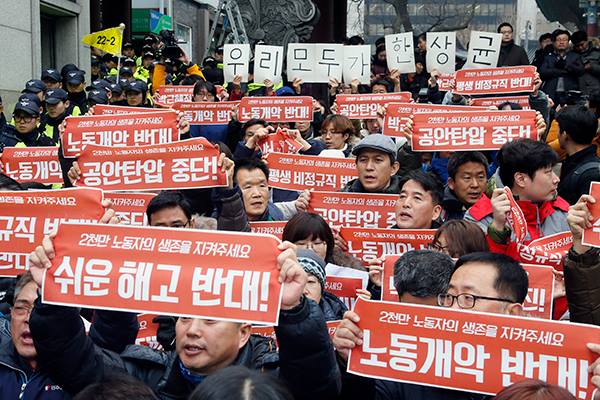Photo credit: KCTU
November Storms
The same day Paris was hit by coordinated mass killings, in Seoul, almost 100 thousand took the streets in the country’s largest demonstrations since the anti-FTA mobilizations of 2008. To honor the momentous occasion, the government used unflinching force against protesters, firing tear gas and water cannons at hundreds of protesters, making over 50 arrests and leaving almost 100 injured. Among the injured was Baek Nam-Ki, a 69-year-old farmer who suffered a severe brain injury and remains in critical condition.
President Park Geun-Hye has proven herself worthy of the title, “Dictator’s Daughter” , declaring the demonstrations illegal and banning protesters’ use of masks to protect themselves against the state’s crackdown on activists. Other demos have still taken place since, in defiance of Park’s orders, with the participation of up to 10 thousand people.
During the last few weeks, a campaign of state terror has been underway. Police raided a dozen union offices , harassing labor activists and confiscating documents. On December 10, KCTU President Han Sang-Gyun was arrested under charges of violating the Assembly and Demonstration Act and Obstruction of Traffic. Han may also face charges of “inciting violence” during November 14 demonstrations. If convicted, he can serve up to 10 years in prison.
The Enemy Within
We watched as François Hollande seized upon the Paris attacks to raise battlecries against “radical Islam,” increase airstrikes in the Middle East, and raid thousands of Muslim homes, mosques, and businesses. Thousands of miles away, President Park has adopted anti-terrorism rhetoric to suit her own purposes, calling protesters enemies of the state.
The left and workers of South Korea are not new to these attacks. For years, Park and the administrations before her have fired blow upon blow, tearing apart the livelihoods of workers and farmers through restructuring and privatization projects, displacing masses of urban poor, making education undemocratic and unaffordable, and silencing political dissent. To pursue these ends, the capitalists have secured what Hankyoreh news calls a situation of “illiberal democracy” through the undisputed servility of government institutions and instruments of repression. The entrance of the Lee Myung-Bak administration in 2008 marked a sharp right turn and reduction of democratic freedoms. Harking back to the days of military dictatorship, Lee expanded the criminalization of protest and left activism.
Then in 2013, Saenuri Party’s Park Geun-Hye entered the scene. During her first year in office, Park invoked the anti-communist National Security Law to arrest a National Assembly Member of the Unified Progressive Party and dissolve the UPP on the grounds that the party was “under orders from North Korea to subvert the South Korean state through violent revolution.”
But the recent events have thrust South Korean unrest into the international eye and uncovered the grisly underbelly of South Korea’s “wondrous” economy: a gross intensification of productivity at the cost of worker’s hard-fought security and democratic rights.
Flexible Labor
The ruling class is forcing workers into submission and molding them into more “flexible” labor force by issuing a series of labor market reforms in line with the IMF’s neoliberal adjustments after the 1997 crash. At first, the reforms will be introduced in the public sector, but will gradually be adapted in private firms. The seniority-based wage system will be replaced by “performance-based” wages. The conditions for firing workers will be greatly “relaxed,” giving bosses the power to terminate an employee for “low performance” and send them off – no job, no severance. The state wants to cut workers’ pay after they turn 55 years old due to the “reduced productivity” of older workers and the need to create jobs for youth. Employers will also be able to change employment regulations any time, in any way, without worker or union consent.
These measures will pack the corporate arsenal with ways to shut down worker unrest, gut labor unions, and expand the use of cheap, temporary (“irregular”) labor; thus creating a “slavery-like work environment where workers constantly have to curry favor with their boss.”
The reforms are intended to save South Korean’s export-dependent economy from its own intrinsic turbulence. A sharp economic slowdown and 15 percent drop in exports caused by the collapse of Chinese markets earlier last summer turned the bosses – with the state as their best weapon – to the working class and poor as a solution to their own crisis. The previous terms of the social contract between labor and capital are being re-written at workers’ expense.
Making Irregular Permanent
As early as the late 90s, “irregular” workers – those who labor in the most low-paying sectors, particularly retail, women, youth, and migrants – emerged in droves, facing abject working conditions, and in the case of migrants, slave-like conditions that locked them into abusive employers for fear of criminalization and deportation under the Employee Permit System.
Once thought of as a transient position – as the label “temp worker” suggests – irregular workers are now positioned at the faultlines of a shifting terrain. During the last few decades, they have fought to gain full and real support from industrial, organized labor, which was slow to recognize that the plight of irregular workers were only foreshadowing what would become a problem for all workers. While left organizations saw this and threw their weight behind the struggles of women, migrants, and precarious workers, Big Labor paid relatively little attention to the problem. Says KCTU President Han, “Back then, we had no idea just how serious the problem of irregular/precarious employment could become.”
South Korea’s irregular workers lie at the nexus of the degradation of the power of organized labor and the reconfiguration of class forces that would leave the ruling class with more weapons to exploit, displace, suppress the working class and poor.
Broad Coalition Led by Labor
On the other side of the balance lies the possibility for a new wave of resistance led by young and irregular workers. In the last few years, workers in healthcare, transportation, auto, and trucking have led strikes against privatization and labor restructuring. In 2013, railway workers went on a three-week strike , which was followed by a general strike organized by both the FKTU and the KCTU.
And in the last few months, we have witnessed a nascent coalition effort. The November and December mobilizations, while heterogeneous and casting a wide net of various sectors of the poor and working class, have been remarkably coordinated and united – some 50+ organizations of labor, farmers, youth, and urban poor have joined in the “People Power” coalition, forming a national coordinating body as well as local committees to mobilize throughout the country.
The linking of the protection of labor rights with democratic demands, including the defense of public education and freedom of speech, justice for Sewol ferry victims, and the fight against the Trans-Pacific Partnership mega-trade agreement, are signs of progress in the formation of a movement led by labor.
No Truce
Prior to the November mobilizations, Han said, “If the national assembly pursues the labor market reform and the government issues a directive to enforce the administrative and legislative reforms, we are prepared to launch a general strike. And this time, it will not be a one-day strike. We’re talking about stopping production, freight trucks stopping in their tracks, railroad and subway workers on illegal strikes, and paralyzing the country so that the government will feel the outrage of the workers.” While Wednesday’s general strike involved the participation of many thousands of workers, it cannot be said to have been successful in paralyzing the country.
The question remains: how will the labor movement push beyond the ephemeral victory of a social contract (or “truce”) with capitalists? Improved terms of exploitation are readily dismantled at the convenience of the bosses. South Korean labor has strengthened its fight and asserted its hegemony by taking up the demands of students, farmers, and the poor. Its coalition efforts signal progress. These recent developments reveal the urgency for revolutionary direction and organization by the proletariat – migrant, irregular, and regular workers united – as well as the role of an independent party of the working class that can fight for more than just safeguards against the most egregious practices.











